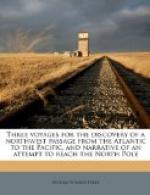Piles of stones and the remains of Esquimaux habitations were everywhere to be seen, and Mr. Ross met with their marks even on the highest hills; but none appeared of recent date. The reindeer were here very numerous. Mr. Ross saw above fifty of them in the course of his walk, and several others were met with near the tents. A large one was shot by one of the men, who struck the animal; as he lay on the ground, a blow on the head with the butt end of his piece, and, leaving him for dead, ran towards the tents for a knife to bleed and skin him; when the deer very composedly got on his legs, swam across a lake, and finally escaped. A small fawn was the only one killed. Three black whales and a few seals were playing about near the beach.
Our people being somewhat fatigued with walking, were allowed to rest till half past one in the morning of the 29th, when, it being high water, the tents were struck and the boat loaded. I found that Captain Lyon had returned on board the preceding evening, having accomplished his object in a shorter time than was expected.
That no time might be lost in running the ships through the narrows, I directed three boats from each to be prepared, for the purpose of sounding every part of this intricate, and, as yet, unknown passage, which I named after Captain THOMAS HURD, of the royal navy, hydrographer to the admiralty. Giving to the officer commanding each boat a certain portion to accomplish, I reserved for my own examination the narrowest part of the channel; and at thirty minutes past one P.M., as soon as the flood tide began to slacken, we left the ships and continued our work till late at night, when, having received the reports of the officers, and made out a plan of the channel for each ship, I directed everything to be in readiness for weighing at the last quarter of the ebb on the following morning. Much as I lamented this delay, at a period of the season when every moment was precious, it will not appear to have been unnecessary, when it is considered that the channel through which the ships were to be carried did not in some places exceed a mile in breadth, with half of that space encumbered with heavy masses of ice, and with an ebb tide of six knots running through it.




